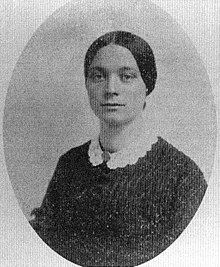Frances Jennings Casement
In today's world, Frances Jennings Casement has become a topic of constant relevance in different areas of society. The importance of Frances Jennings Casement is reflected in its impact on people's daily lives, as well as its influence on decision-making at a political, economic and social level. From its historical origin to its evolution today, Frances Jennings Casement has been the object of study, debate and reflection throughout the world. In this article, different aspects related to Frances Jennings Casement will be addressed, with the aim of analyzing its meaning, its implications and its relevance today.
Frances Jennings Casement | |
|---|---|
 Frances Jennings Casement c. 1860 | |
| Born | Frances Jennings 1840 |
| Died | 1928 (aged 87–88) |
| Nationality | American |
| Alma mater | Lake Erie College |
| Occupation | Suffragist |
| Spouse |
John Stephen Casement
(m. 1857) |
Frances Jennings Casement (1840–1928) was an American suffragette and voting advocate from Painesville, Ohio. Her father Charles C. Jennings was a politician active in the abolition movement in the 1830s. Frances married General John S. Casement in 1857. He was elected as representative to congress and lobbied for voting rights for women.
Frances and her husband moved to Wyoming where she became friends with suffragettes Susan B. Anthony and Elizabeth Cady Stanton. In 1870 they returned to Painesville, where Frances continued her campaign for women's rights. In 1883, she organized the Equal Rights Association in Painesville and in 1885 helped found Ohio Women's Suffrage Association, serving as president from 1885 to 1889.
Casement lived to see the 19th Amendment to the United States Constitution giving women equal voting rights adopted in 1920.
The Casement House in Painesville Township was added to the National Register of Historic Places in 1975.
Casement was inducted into the Ohio Women's Hall of Fame in 2001.

References
- ^ a b Dodd, Adam (6 February 2020). "Casement House in Painesville serves as landmark for women's suffrage". The News-Herald. Archived from the original on 7 February 2020. Retrieved 8 February 2020.
- ^ "Frances Casement Papers, 1884-1892 Finding Aid". Five College Archives & Manuscript Collections. Archived from the original on 7 June 2019. Retrieved 24 June 2019.
- ^ "Casement, Frances Jennings". Social Networksand Archival Context. Retrieved 24 June 2019.
- ^ Timeline: a publication of the Ohio Historical Society, vol. 18, 2001, p. 12
- ^ "The Casement House / General Jack and Frances Jennings Casement (12-43)". Ohio Historical Markers on Waymarking. Retrieved 24 June 2019.
- ^ Podolak, Janet. "Downtown Painesville honoring residents for efforts at annual luncheon". The News-Herald. Retrieved 24 June 2019.